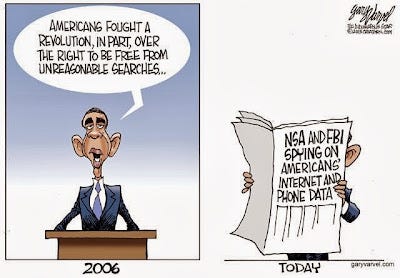FISA Court ruling: NSA can keep spying on inocent Americans phone calls

This won't come as a huge surprise, I would imagine, but the telephony metadata dragnet collection that has to be renewed every few months "expired" today and was promptly reapproved by the FISA court, because "fuck you, that's why." That's not quite what they said, but consider it the bureaucratic-speak equivalent, coming from the Director of National Intelligence:
Previously on several occasions, the Director of National Intelligence declassified certain information about this telephony metadata collection program in order to provide the public with a more thorough and balanced understanding of the program. Consistent with his prior declassification decision and in light of the significant and continuing public interest in the telephony metadata collection program, DNI Clapper has decided to declassify and disclose publicly that the government filed an application with the Foreign Intelligence Surveillance Court seeking renewal of the authority to collect telephony metadata in bulk, and that the court renewed that authority.
The administration is undertaking a declassification review of this most recent court order.
Of course, it's true that last month, the previous order rubber-stamping this approval was declassified and revealed. Even though the same thing has been rubber stamped every few months for at least the past seven years, this time there was an attempt at a full justification for why it made sense. Of course, since it was a one-sided situation, without any adversarial hearing or opinion, it allowed the FISA court to make up its own rules and completely contradict the Supreme Court (to whom it's supposed to listen). It seems highly doubtful that the eventual declassified version of this rubber stamp will be any different than the last one.
Of course, in the last three months, we've also learned that this program of collecting data on every phone call in the US has been necessary to stop precisely zero attacks in the US -- but it did apparently lead them to a taxi driver sending some money to some not very nice people in Somalia. And, because of that, the NSA gets to keep track of everyone's phone calls. As has been explained repeatedly, this seems to go against not just the spirit and intended purpose of the 4th Amendment, but the plain language of that same Amendment. But, the FISA court has earned its rubber stamp reputation for a reason, and apparently it's not about to give up on it.
http://www.techdirt.com/articles/20131011/16065524845/fisa-court-rubber-stamps-continued-collection-metadata-every-single-phone-call.shtml
http://presstv.com/detail/2013/10/12/328956/us-court-extends-spying-on-phone-calls/
Feds begged Washington Post reporter not to name companies in PRISM, because it worried they'd stop cooperating:
At a recent event held by the Cato Institute concerning the NSA's surveillance overreach, Washington Post reporter Barton Gellman, who broke the PRISM story and (of course) has been one of the three key reporters on all of the Snowden docs, noted that the feds begged him not to reveal the nine companies listed as participants in the PRISM program. Gellman and the Post refused, noting that the government's reasons for wanting to keep the names out didn't raise any legitimate security concerns, but rather had to do with making life easier for the NSA:
The thing that the government most wanted us to remove was the names of the nine companies. The argument, roughly speaking, was that we will lose cooperation from companies if you expose them in this way. And my reply was "that's why we are including them." Not in order to cause a certain result, or to get you to lose your cooperation but if the harm that you are describing consists of reputational or business damage to a company because the public doesn't like what it's doing or you're doing, that's the accountability we are supposed to be promoting.
Right. That's called journalism: revealing information that the public should know about in order to make its own decisions about what they're doing with their information and privacy, which has been kept from them. Yes, it makes sense for the press to refrain from revealing direct sources and methods of surveillance that create a real national security issue -- but keeping the public in the dark about how the government has been able to compromise these companies isn't a national security issue at all.
http://www.techdirt.com/articles/20131011/01265824839/feds-begged-washington-post-reporter-not-to-name-companies-prism-because-it-worried-theyd-stop-cooperating.shtml



